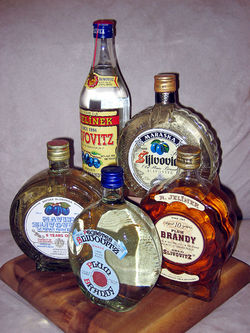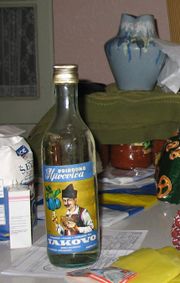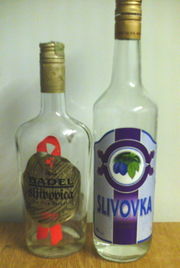Slivovitz

Slivovitz or Sliwowitz (English pronunciation: /ˈslɪvəvɪts/; Serbian: Шљивовица šljivovica, Bosnian: šljìvovica, Croatian: šljìvovica, Czech: slivovice, German: Sliwowitz , Italian: slivovitz, Polish: śliwowica, Romanian: şliboviţă, Slovak: slivovica, Slovene: slivovka) is a distilled beverage made from Damson plums.[1] It is frequently called plum brandy,[2] and in the Balkans is part of the category of drinks called rakia.
Contents |
Origin
The word Slivovitz derives from the Serbo-Croatian (Slavic) "šljiva" or Czech "slíva" – damson plum,[3] whereas "-vice" /vɪtsɛ/ (in Czech version of the name) or "-vica" /vɪtsa/ (in Slovak, Croatian and Serbian) is a common postfix to add to the name of the brandy to distinguish what fruit was distilled (e.g. meruňka (apricot) → meruňkovice (apricot brandy), broskev (peach) → broskvovice (peach brandy), švestka (plum) → švestkovice (plum brandy), …). The exact origins of Slivovitz are unknown but it is believed to have been first produced in the Balkans,[4] Bosnia, Croatia,[5][6] Serbia,[7][8] Moravia,[9][10] Czechoslovakia,[11] Hungary[11] or Bulgaria.[11]
Production and consumption
Slivovitz is primarily produced in Slavic regions of Central and Eastern Europe, both commercially as well as by many households on an informal, homemade basis. Primary producers are in Czech Republic, Slovakia, Slovenia, Lithuania, Croatia, Bosnia, Poland, Hungary, Bulgaria, Romania, Serbia and North-East Italy.[12] It is most popularly consumed in those nations, as well as wherever communities of expatriate from these nations exist. Similar plum brandies are also produced in Switzerland, France, the United States, and Canada, but marketed under other names, such as brandy, Pflümli, or eau de vie.
Distilling process
In the manufacturing process, the plums and a liberal proportion of the ground kernels are first crushed and pressed, then starch and sugar may be added to the juice, and the mixture is allowed to ferment. Distillation gives the crude product, and clarifying processes complete the liqueur, but aging is required to develop its finer qualities. Its pleasing flavor is due largely to the plum kernels, which contain a considerable percentage of amygdalin, the characteristic component of bitter almonds.[1]
Some producers have obtained a Hechsher for their slivovitz, certifying that it is kosher.[13]
Imitation slivovitz is made by flavoring spirits with prune juice and artificial oil of bitter almonds.[1]
Producers
Bulgaria
- Troyanska Slivova (owned by Rudolf Jelínek)[14]
- Tetevenska Slivova (owned by Rudolf Jelínek)[15]
- Lesidrenska Slivova[16]
- Elenska Slivova (owned by the Lyaskovets winery)[17]
Croatia
Czech Republic
Hungary
- Zwack
Italy
- Luxardo[23]
Poland
Serbia

Serbian Slivovitz is consumed chilled in a special shot glass called "čokanji-čokanjčići" ("fićok-fićuci" in Vojvodina) of 0.03 to 0.05 dl.
In 2004, over 400 000 litres of Sljivovica was produced in Serbia.[26]
Following the claims of several nations to the protected designation of origin, in October 2007 the European Union went for a compromise solution, leaving "slivovitz" as a generic name, and granting individual nations the right to protect the origin with their own adjective.[27] Thus, "Serbian Slivovitz" (Srpska šljivovica) will become Serbia's first certified national brand.[28]
The most famous and most popular region for making and use of Sljivovica is Šumadija region.
There is also a town in Zlatibor, called Šljivovica.
Producers
- Flores[29]
- Wolf Inter Export|Stefan Nemanja slivovitz[30]
- Navip[31]
- Stara Sokolova[32]
- Zlatna Biserka[33]
- Katz Rakije[34]
- Prokupac[35]
Slovakia
Slovenia
- Budič[39]

United States
References
- ↑ 1.0 1.1 1.2 Ward, Artemas (1911). "Slivovitz". The Grocer's Encyclopedia. New York. pp. 567. http://digital.lib.msu.edu/projects/cookbooks/coldfusion/display.cfm?ID=ency&PageNum=575. Retrieved 2008-05-30.
- ↑ Haraksimová, Erna; Rita Mokrá and Dagmar Smrčinová (2006). "slivovica". Anglicko-slovenský a slovensko-anglický slovník. Praha: Ottovo nakladatelství. pp. 775. ISBN 80-7360-457-4.
- ↑ http://www.merriam-webster.com/dictionary/slivovitz
- ↑ Lennox, Doug (2003). "Food & Drink". Now you know. Toronto: Dundurn. pp. 102. ISBN 9781550026481. OCLC 52455722.
- ↑ The World and its peoples: Austria, Hungary, Czech Republic and Slovakia, Poland. New York: Greystone Press. 1965. pp. 33. LCCN 65-20542. OCLC 399998. "Slivovitz is a brandy made from plums which originated in Croatia."
- ↑ Porter, Darwin; Danforth Prince (2005). Frommer's Vienna & the Danube Valley. Hoboken, New Jersey: John Wiley & Sons. pp. 230. ISBN 0764597175. OCLC 60649498 60397040 60649498. "Two of the most famous and favored liqueurs among Austrians are slivovitz (a plum brandy that originated in Croatia) and barack (made from apricots)."
- ↑ Bruce, Dave (1980). "Dining Discoveries". Home & Away in Kentucky (American Automobile Association): 14. http://books.google.com/?id=kwRgAAAAIAAJ&q=slivovitz+serbian&dq=slivovitz+serbian. Retrieved 2008-09-16. "To get things started, have a round or two of Slivovitz (Serbian plum brandy)...".
- ↑ Branigan, James Joseph; Harold Reginald Jarrett (1975). "Serbia". The Mediterranean Lands. Michigan: Macdonald & Evans. ISBN 0-7121-1367-3. OCLC 60004517.
- ↑ Wilson, Neil (2005). Prague. Lonely Planet. pp. 16. ISBN 1-74059-758-3. OCLC 58434605. "The fiery and potent slivovice (plum brandy) is said to have originated in Moravia..."
- ↑ Warren, Matt; Neal Bedford; Jane Rawson (2004). Czech & Slovak republics. Lonely Planet. pp. 65. ISBN 1-74104-046-9. OCLC 56466554. "Slivovice is a fiery, potent plum brandy said to have originated in Moravia..."
- ↑ 11.0 11.1 11.2 Arthey, David; P. R. Ashurst (1996). Fruit processing. London: Blackie Academic & Professional. pp. 129. ISBN 0-7514-0039-4. OCLC 34116886. "Type: Slivovitz; Synonym: Plumb brandy; Country of origin: Serbia, Former Czechoslovakia, Hungary, Bulgaria"
- ↑ Pokhlebkin, William (1992). "Appendix 5: The Raw Materials and Production Techniques of Other Principal Spirits of the World". A history of vodka. London: Verso Books. pp. 206. ISBN 0-86091-359-7. OCLC 28183139.
- ↑ "Rudolf Jelínek: Kosher production". http://www.rjelinek.cz/kosher-vyroba.php?LANG=en. Retrieved 2008-05-30.
- ↑ "Сливова ракия" (in Bulgarian). Винпром-Троян. http://www.vinprom-troyan.bg/page/produkty/7/. Retrieved 2008-08-15.
- ↑ "Чехи купиха тетевенския винпром "Дестила"" (in Bulgarian). Дневник. http://www.dnevnik.bg/show/?storyid=279646. Retrieved 2008-08-15.
- ↑ "Лесидренска сливова ракия" (in Bulgarian). Леседра. http://www.lesedra.hit.bg/lesidrenska-slivova-rakia.htm. Retrieved 2008-08-15.
- ↑ "Our high [sic] alcoholic drinks". Lyaskovets Winery. http://winery.lyaskovec.com/en/rakia.htm. Retrieved 2008-08-19.
- ↑ "Product range: spirits". Badel 1862. http://www.badel1862.hr/en_jap.asp. Retrieved 2008-08-13.
- ↑ "MARASKA ZADAR". Maraska Zadar. http://www.maraska.hr/. Retrieved 2008-12-12.
- ↑ "Company profile". Rudolf Jelínek. http://www.rjelinek.cz/profil-spolecnosti.php. Retrieved 2008-08-13.
- ↑ "Slivovitz". Zufanek. http://www.zufanek.cz/en/slivovitz.html. Retrieved 2008-08-13.
- ↑ "Slivovice". Bonfier. http://www.bonfier.cz. Retrieved 2008-12-15.
- ↑ ""Sljivovica"". http://www.luxardo.it/splash_intro.aspx?language=en.
- ↑ "Passover Slivovitz". Polmos Bielsko-Biała. http://www.polmos.bielsko.pl/en/passover.html. Retrieved 2008-09-16.
- ↑ "Our products". Polmos Toruń. http://www.polmos.torun.pl/english/t5.html. Retrieved 2008-09-16.
- ↑ http://www.siepa.gov.rs/attach/FruitIndustryInSerbia.pdf
- ↑ "Problemi oko izvoza šljivovice" (in Serbian). B92. 2007-10-01. http://www.b92.net/info/vesti/index.php?yyyy=2007&mm=10&dd=01&nav_id=265855. Retrieved 2007-10-11.
- ↑ "Slivovitz becomes Serbia’s first brand". B92. 2007-09-28. http://www.b92.net/eng/news/economy-article.php?yyyy=2007&mm=09&dd=28&nav_category=98&nav_id=44132. Retrieved 2007-10-11.
- ↑ "Flores". http://www.flores.rs/flores.htm. Retrieved 2010-07-14.
- ↑ "STEFAN NEMANJA slivovitz". http://www.stefannemanja.com. Retrieved 2008-08-13.
- ↑ "Navip products". http://www.navip.rs/izvoz/proizvodi.html. Retrieved 2010-07-14.
- ↑ "Stara Sokolova". http://www.starasokolova.com/index_eng.htm. Retrieved 2008-09-11.
- ↑ "Zlatna Biserka". http://www.zlatna-biserka.com/. Retrieved 2009-06-10.
- ↑ "Katz Rakije". http://www.katz-rakije.com/index.html. Retrieved 2008-12-29.
- ↑ [1]
- ↑ "Fruit Liquors". St. Nicolaus. http://www.st-nicolaus.sk/index.php?page_id=386&noitem%91%92=333&noitem%91%92=335&noitem%91%92=337. Retrieved 2008-08-13.
- ↑ "Fruit Destilates". s52. http://www.s52.sk/. Retrieved 2008-09-01.
- ↑ "Bošacka Slivovica". Old Herold. http://www.oldherold.sk/. Retrieved 2009-04-24.
- ↑ "Fruit Liquors". Budič. http://www.budic.si/ostrilci/slivovka. Retrieved 2009-08-01.
- ↑ "Spirit of Plum". Black Star Farms. http://www.blackstarfarms.com/winery/spirits/?id=161. Retrieved 2008-08-13.
- ↑ "Additional Clear Creek Eaux de Vie". Clear Creek Distillery. http://clearcreekdistillery.com/other.html. Retrieved 2008-08-13.
- ↑ "Jack and Jenny Plum Brandy". Peach Street Distillers. http://www.peachstreetdistillers.com/prod-plum-brandy.htm. Retrieved 2008-08-13.
- ↑ "Plum Brandy". Stringer's Orchard. http://www.stringersorchard.com/brandy.htm. Retrieved 2008-08-13.
- This article incorporates text from the public domain 1911 edition of The Grocer's Encyclopedia.
External links
- List of brands
- Brands of slivovitz
- Katz Rakije
- Zlatna Biserka
- Srpska Sljivovica
- Sliwowica Lacka
- Burning Still | Distilling Community
See also
- Eau-de-vie
- Rakia
- Palinka
- Raki (alcoholic beverage)
- Tsikoudia
- Tsipouro
- Ţuică
- Pálenka
|
|||||||||||||||||||||||||||||||||||||||||||||||||||||||||||||


